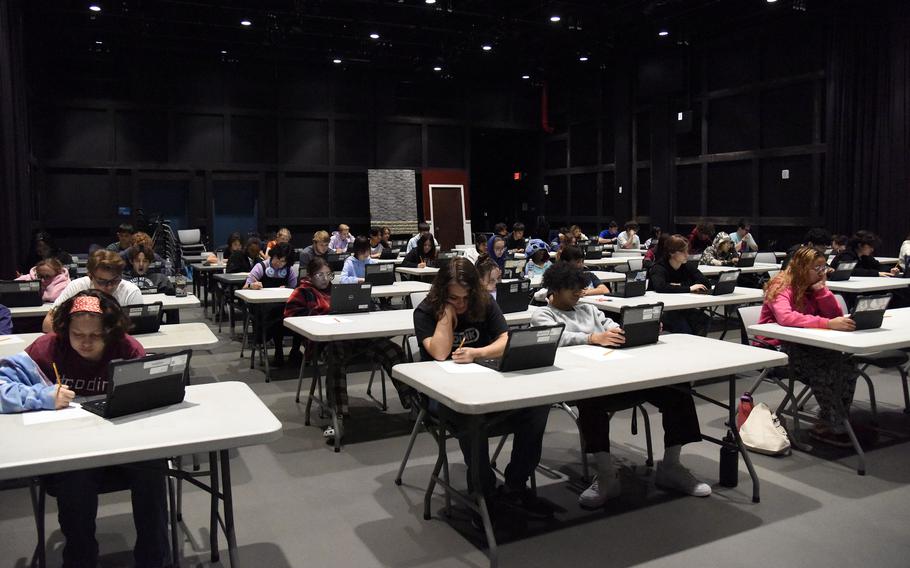
High-schoolers take an electronic version of the Armed Services Vocational Aptitude Battery, or ASVAB, at Yokota Air Base, Japan, Thursday, Nov. 9, 2023. (Juan King/Stars and Stripes)
YOKOTA AIR BASE, Japan — For the first time, high-schoolers at U.S. military bases in Japan have taken a new, electronic version of the test that gauges aptitude for military and civilian careers.
Students at Yokota High School, whose parents work at the airlift hub that’s also the headquarters of U.S. Forces Japan, sat for the Armed Services Vocational Aptitude Battery, or ASVAB, test on Thursday.
It was the first time the electronic version of the test, being rolled out at on-base schools worldwide, was given in Japan, said school information specialist Colleen McDougall as students tested in a nearby classroom that morning.
“This is the largest ASVAB that has ever been given in the Pacific,” she said.
More than four in five of the school’s 10th through 12th graders — 154 students — were taking the test, McDougall said.
“The test has been offered at the school for decades, but this is the first time it has been done electronically which gives instant results,” she said.
“It’s a powerful college and career planning tool,” she said.
The test matches students with careers and suggests courses they should take in high school and college. It also lists universities offering recommended courses and quotes tuition costs and what jobs pay in each state.
The test gives students a valid ASVAB score that they can use to enter military career fields for two years, McDougall said.
Between 8% and 10% of Yokota students enter the military, she said.
“That’s normal with your family already knowing about the military,” she said.
The electronic testing comes amid a recruiting crisis with officials citing factors such as a strong civilian job market and obesity among young people that makes them unfit to serve.
One of those who took the test at Yokota on Thursday — student board president Melia Okamoto — said she wants to serve in the military as a physical therapist.
“I’m acquainted to the lifestyle and military benefits that go with it and it sets you up to have a career in the private sector,” she said.
Another test-taker, Makayla Lawry, a junior who home-schools at Yokota, said she wants to be a dentist.
Lawry said she has no plans to join the military, although she recognizes the benefits of service such as travel, a stable career and health care.
Lacroyx Harris, a sophomore who played Rumpelstiltskin in the school play, said he’s contemplating a career as a financial adviser, stockbroker or actor.
The test backed up his career interests but also suggested microbiology, he said.
Air Force Maj. Mark Sideno, a JROTC instructor at Yokota, said his twin sons, Nathaniel and Kyle, scored well on the test in science, technology, engineering and math.
“Based on their scores it gave them a road map to classes to prepare for high school, university and career,” he said.
One surprising career suggestion that the test recommended for his sons was nano engineering – designing ultra-small machines -- Sideno said.
Students can take the electronic ASVAB anywhere the U.S., even if they attend schools that don’t allow recruiters or JROTC on campus, he said.